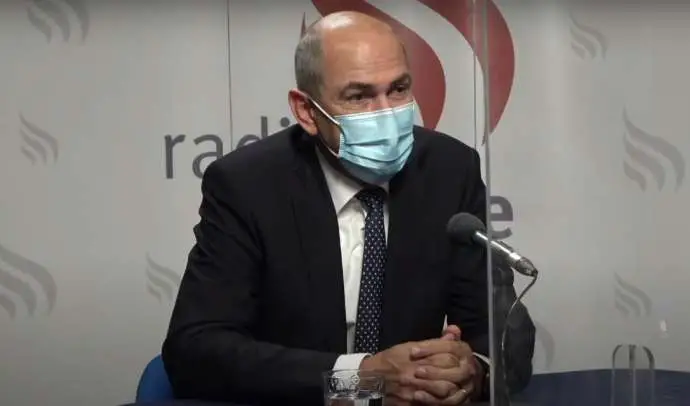STA, 14 December 2021 - Centre-left opposition MPs clashed with PM Janez Janša during Tuesday's question time in parliament over what they claim is mafia-style governance of the country by Janša, his SDS party and the government. Janša dismissed the allegations, while saying mafia-style governance indeed exists, has very deep roots, yet comes from the transition left.
According to the Left's Matej T. Vatovec, when Janša is in opposition he bills himself as the one who will eliminate corruption, but once in power, "the story flips upside down and in a few years or months, we have enough corruption scandals for a decade".
He pointed to scandals that broke out since Janša's government assumed office in March 2020, such as face masks, rapid antigen tests, purchases of ventilators from Janša's brother, the scandal involving the environment minister, etc.
The MP claimed that most of the cases become statute barred because the Democrats (SDS) know how to exert pressure on judges and take over the police force to "make sure everything is swept under the rug".
Dismissing all the allegations as "lies and insinuations", Janša said "you have actually more or less made up or twisted all this to avoid discussing the actual behind-the-scene criminal doings in this country".
As deputy groups presented their views, Robert Pavšič from the Marjan Šarec List (LMŠ) criticised the government for violating the constitutions and encroaching on laws, while he also took issue with "brutal staffing and interference in a number of the country's vital subsystems".
The Social Democrats' (SD) Marko Koprivc said anything is possible "under Janšism, including the dissolution of the rule of law", as he pointed to pressure on the media and attempts to undermine NGOs.
Unaffiliated MP Janja Sluga highlighted the complications with the appointment of European delegated prosecutors, Janša meeting medical suppliers and their lobbyists, the role of his lawyer Franci Matoz in state-owned companies, Hungarian millions spent on advertising in the SDS-owned media and the construction of the Koper-Divača rail track.
Marko Bandelli from Alenka Bratušek Party (SAB) said this government "is drenched in corruption and applies mafia approaches, which is revealed in every scandal."
On the other hand, coalition MPs said Slovenia has seen mafia doings since its very beginning. "Even before the country became independent, the leftist political forces tried to prevent its independence," said Danijel Krivec from the ruling SDS.
Listing what he sees as mafia doings, Krivec highlighted former President Milan Kučan allowing in the spring of 1991 the Yugoslav People's Army to disarm Slovenia's Territorial Defence, the launch of the Patria defence scandal against Janša, a billion dollars in Iranian money laundered at the NLB bank to finance terrorism, etc.
Similarly, the SMC's Monika Gregorčič blamed it all on the non-transparent privatisation after Slovenian became independent, saying it resulted in a privileged elite, the so-called transition left, gaining political power.
This elite enabled systemic solutions to its liking to be adopted, while the economic power acquired in this way opened the door to all social subsystems, including the media. "The circle was thus completed, producing a system that could be termed a para-state or a deep state," said Gregorčič.
New Slovenia's (NSi) Andrej Černigoj also pointed to the TEŠ power station being overpaid by half a billion euro and to the bank shortfall of EUR 5 billion under centre-left governments.
Janša commented on many of the scandals mentioned by the coalition, criticising the opposition for not criticising violations when perpetrated by people from their own ranks. He dismissed the criticism about the judiciary saying candidates without experience or a graduation diploma could be appointed judges. "This is the state being run mafia-style."
A heated debate followed also after Janša left the session, with the LMŠ's Pavšič suggesting the session be closed to the public to present some confidential documents, which the MPs did not endorse in a secret vote. Finding it unimaginable the MPs would not want to discuss specific criminal dealings, he said the vote "proves we live in a mafia state".






